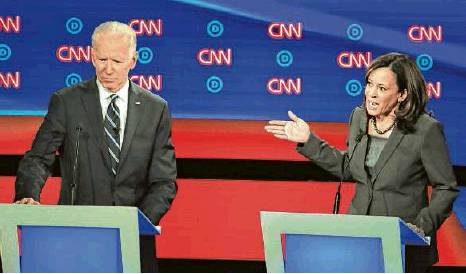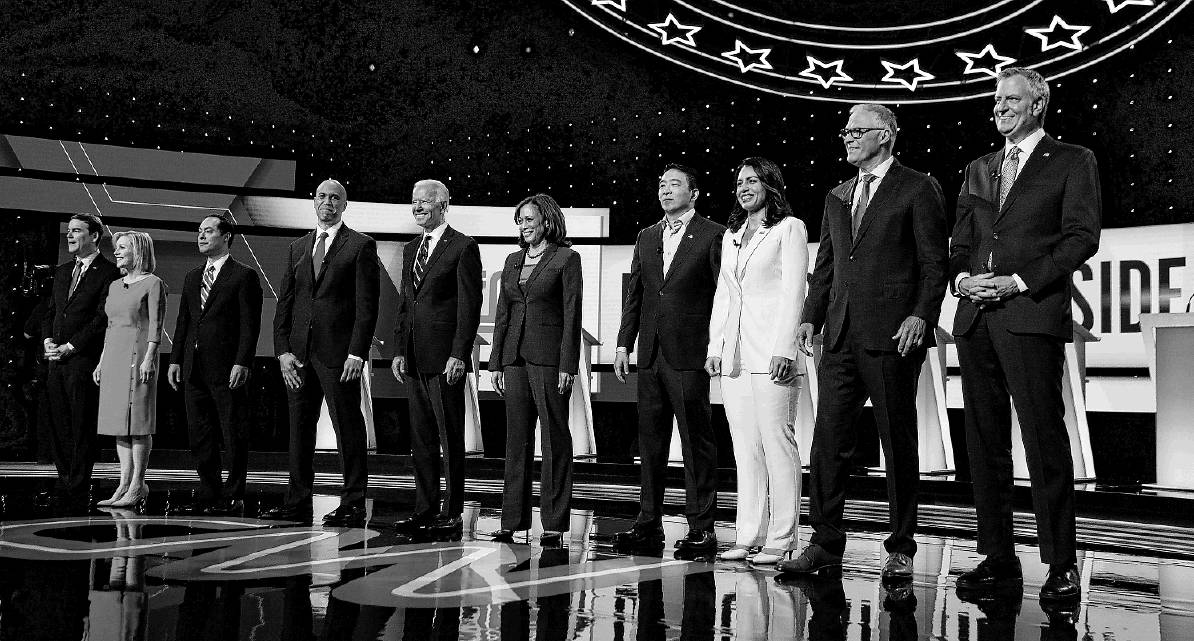Biden, Harris trade jabs in round 2
Health care takes focus on second night as 2020 hopefuls clash over competing plans
By Alexander Burns and Jonathan Martin NEW YORK TIMES
DETROIT — Former Vice President Joe Biden and Sen. Kamala Harris of California renewed their political rivalry almost instantly on the debate stage Wednesday night, as Biden accused Harris of peddling “double talk” on the central campaign issue of health care and Harris defended her newly unveiled plan as a pragmatic version of single-payer care.
Standing side by side in Detroit, the two candidates whose clash over race and school integration defined the first round of debates in June engaged each other at once on the question of how to cover Americans’ medical costs. This time Biden took the offensive, noting that Harris had rolled out “several plans so far,” the most recent of which would take 10 years to kick in and cost trillions to disrupt the existing system of private insurance.
Voters, Biden said, should be skeptical “anytime somebody tells you you’re going to get something good in 10 years.”
Harris fired back quickly. “You’re just simply inaccurate in what you’re describing,” she said, countering that Biden’s proposal to create an elective government-backed health insurance option would leave many Americans uncovered.
“Your plan, by contrast, leaves out almost 10 million Americans,” she said, adding, “The cost of doing nothing is far too expensive.”
But Biden persisted. Echoing some of the criticism that centrist Democrats leveled against Sens. Elizabeth Warren and Bernie Sanders in Tuesday night’s debate, the former vice president warned that Harris’ plan would be costly, disruptive and slow to take effect.
Defending his own proposal, Biden called it a prudent update to the system devised under the Obama administration.
“My response is: Obamacare is working,” he said.
It was the second night of lengthy and contentious exchanges among the candidates over the future of health care in the country. Like the 10 contenders who debated Tuesday, the candidates split over whether the country should retain some form of the Affordable Care Act or completely transform the system into some form of “Medicare for All.”
The exchanges over health care on both nights exposed a fundamental schism in the party, between more traditional reformers who are seeking to improve on the policies of the Obama administration and aggressive liberals who hope to overhaul the U.S. economy and government in a comprehensive way.
At several early moments in the debate, other candidates onstage exhorted Democrats to keep their attention on President Donald Trump and the Republican Party’s efforts to strike down the Affordable Care Act. Sen. Kirsten Gilli-brand of New York told viewers that for Republicans, “their whole goal is to take away your health care,” while Sen. Cory Booker of New Jersey lamented that “the person enjoying this debate most right now is Donald Trump.” He implored Democratic rivals to stop “saying one is unrealistic and the other doesn’t care enough.”
Confronting Biden
Yet there were signs early on that even the lower-profile candidates onstage were looking to shake up the race through confrontation.
Mayor Bill de Blasio of New York City did not even wait for a question: He used his opening statement to blast both the leading candidates onstage, Biden and Harris, depicting them as guardians of the status quo and vowing that he would “tax the hell out of the wealthy.”
“Joe Biden told wealthy donors that nothing, fundamentally, would change if he were president; Kamala Harris said she’s not trying to restructure society,” de Blasio said, countering: “Well, I am.”
But even de Blasio, who is currently an asterisk in the polls, could not escape controversy: His opening remarks were interrupted by protesters bellowing, “Fire Pantaleo” — areference to the New York City police officer whose rough physical treatment of Eric Garner, an unarmed black man, led to his death in 2014, and whose status on the force remains unresolved.
De Blasio was pressed later in the evening by Biden on the Garner case.
In another echo of Tuesday’s debate, the candidates also clashed over how much to liberalize immigration laws — but in even more personal terms. Not waiting to be attacked by his more liberal rivals, Biden said he could not recall Julián Castro, the housing secretary under former President Barack Obama, ever criticizing the administration’s immigration policies.
“If you cross the border illegally, you should be able to be sent back; it’s a crime,” said Biden, rejecting Castro’s plan to decriminalize illegal immigration.
Castro shot back that “it looks like one of us has learned the lessons of the past and one of us hasn’t,” and added that the only element missing in border policy is “politicians who have some guts.”
“I have guts enough to say his plan doesn’t make sense,” Biden retorted.
But the former vice president found himself fending off multiple attacks on the aggressive deportation policies of Obama, forcing him to choose between whether to defend a former president beloved by Democrats or align himself with the more liberal party of 2019.
He mostly chose to link himself to Obama despite being repeatedly pressed by de Blasio, who told him: “You need to be able to answer the tough questions.”
Crime bill attacked
But Biden’s position grew even more uncomfortable when Booker, standing just to his right, said: “You invoke President Obama more than anybody in this campaign. You can’t do it when it’s convenient and then dodge it when it’s not.”
Biden also came prepared for a clash over criminal justice and took aim at Booker’s tenure as mayor of Newark. “In 2007 you became mayor and you had a police department that was, you went out and hired Rudy Giuliani’s guy and engaged in stop and frisk,” he said.
But Booker had acounterattack planned. “You’re dipping into the Kool-Aid and you don’t even know the flavor,” he said, drawing laughs and applause.
Repeatedly highlighting the hard-line crime bill Biden wrote in the 1990s, Booker said: “There are people right now in prison for life for drug offenses because you stood up and used that tough on crime phony rhetoric that got a lot of people elected but destroyed communities like mine.”
Later, when de Blasio again asked whether the former vice president sought to push Obama to the left, this time on criminal justice, Biden turned to another tactic: invoking the former president’s judgment. “He chose me and said it was his best decision,” said Biden.
But that did not stop Harris from reviving her attack from the first debate on his position on busing, as she noted that neither she nor Obama would have been elected to high office had his segregationist colleagues from the 1970s-era Senate gotten their way.
Anticipating a replay of this discussion, though, Sen. Michael Bennet of Colorado won applause with a ready line of his own: “This is the fourth debate that we have had, and the second time that we have been debating what people did 50 years ago with busing when our schools are as segregated today as they were 50 years ago.”
Gillibrand did not pile on Biden but instead explained how could she spotlight matters of racial justice.
“I can talk to those white women in the suburbs that voted for Trump and explain to them what white privilege actually is,” said Gillibrand. “That when their son is walking down a street with a bag of M&Ms in his pocket, wearing a hoodie, his whiteness is what protects him from not being shot.”

